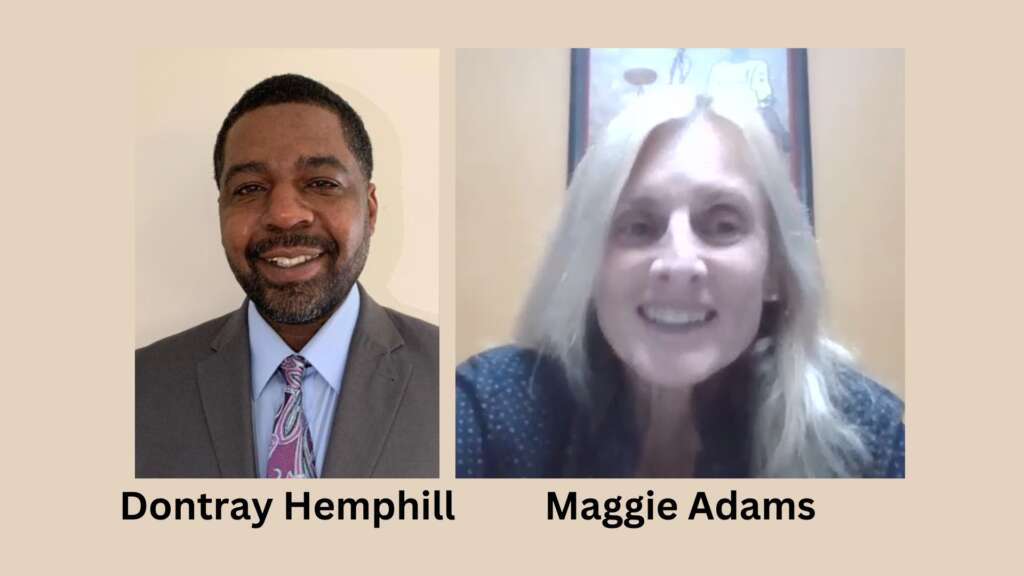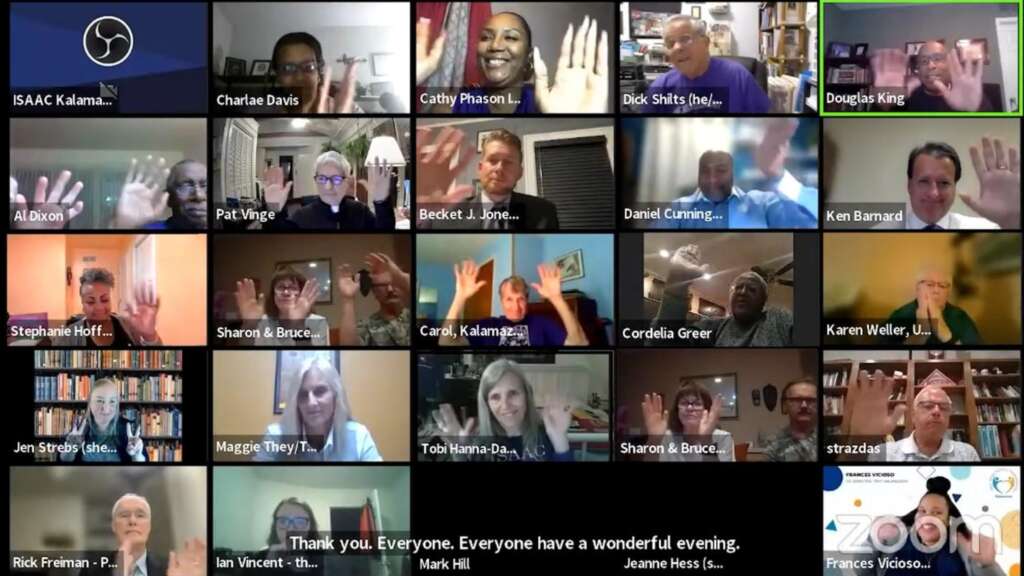
Eye-opening. Attitude-changing. Important to every social justice issue we work on. The Summit on Trauma and Domestic Violence on October 2 was awesome! Here are highlights from just a few of the powerful presentations:
From Dr. Jim Henry, Project Director, Children’s Trauma Assessment Center, WMU:
“The world feels safe if you haven’t been hurt. Trauma shifts your perception to no safety.” “Trauma overdevelops the lower parts of the brain (emotions, and flight, flight or freeze) and makes it harder to access the neo cortex (reasoning).”
“Hurt people, hurt people.” (Bloom 2003) “Ask, ‘What’s their story? Where’s their hurt?’ Being punitive only hurts more and makes offending more likely.”
“There are Resiliency Factors that counter the pain of adverse experiences: Relatedness. Affect Regulation. Mastery/Efficacy. Self Esteem.“
“Three experiences of intense connections in an hour can build a new brain pathway. Someone you feel safe with means something else is possible.”
From Aaron Kinzel, U of M Lecturer in Criminology and Criminal Justice:
“Survivors of violence are often perpetrators of violence.” “I’ve got 9 out of 10 ACEs (Adverse Childhood Experiences.) I was conceived by rape. My father is in prison somewhere. I was groomed from age 5 to be a criminal by my mother’s partners who were violent drug dealers and cat burglars. When I was 8, a violent psychopath married my mother. He came in my room and choked me. I saw him rape my mother. He brought out his pistol as a symbol of power, and pistol-whipped both of us. He put the pistol to my mother’s head and cocked it. I ran away at age 8. At 15, I started using drugs for my pain. My stepdad embraced me for the first time! We were buddies now. He got me selling drugs for him. But I had a problem that he was giving my little brother drugs since he was 5. I overpowered my stepdad, but as he was turning purple my mother pulled me off him.
“In the Criminal Justice System they didn’t give me therapy or try to understand what happened. At 18, I was suicidal, violent, kept a gun on me always. Hyper-vigilant. At a traffic stop, the cop put his hand on his gun, and I pulled mine. Another cop shot 15 times at my car, but me and my girlfriend were not injured! I got a 19-year sentence, at age 19, for attempted murder of a state cop. I was in and out of solitary confinement, which is torture!
“What changed me was older men in the system. Men who’d committed extreme acts of violence taught me, “Violence is never the way.’ They befriended me and instilled values in me. They saw something in me. I took college classes.
“I’ve been home 12 years now. WMU gave me my first job. Then U-M. I’m getting my PhD now. Intervention worked! We need to be smart on crime, not tough on crime! It costs $30,000/year to incarcerate someone, but only $3000/year to help.”
From Jeff Getting, Prosecuting Attorney, Kalamazoo County:
“The prison population in Michigan has been reduced from 50,000 to 38,000. That’s great, but it won’t get much better unless we deal with violence, because 70% of prisoners are in prison for a violent crime. Domestic violence is a good place to start because its impact is so broad.
“A woman sent this letter to me about the idea of a Domestic Violence Court: ‘I saw you on TV. It’s a good idea. I’m in my third 7-year prison term. My mom always told me I’d end up in prison. She let me be assaulted over and over. She said I needed to know what it felt like. I was beaten and told it was out of love. Women who are abused as children, accept abuse as adults. I wish one person had reached out to me. You’re doing a wonderful thing.”
“This is not about overlooking perpetrators actions. It’s not about reducing services for victims. Interventions are necessary. The map of domestic violence locations in Kalamazoo and the map of youth violence locations look the same.
Ted Bunch, chief development officer of “A CALL TO MEN”, who’s recognized internationally for his work to prevent violence against women while promoting a healthy, respectful manhood, gave a very engaging talk. You can watch a similar talk he gave in LA below, but the one he gave for us was even better.

This photo of ISAAC leaders who were at the Summit should have also included Wendy Fields, Jo Woods Brown, Mary Lewis, and probably others too! Pictured are Linda MacDonald, Martha Omilian, Helen Hebben, Rick Omilian, Stephanie Hoffman, Mollie Peterson, Joe Schmitt, Tobi Hanna-Davies and two members of Moms Demand Action for Gun Sense in America.
I’m chagrined that I’m reporting only men’s voices, but also relieved that so many men are taking leadership on ending domestic violence and healing trauma. There were many very powerful voices of women: Attorney Namita Sharma from Brueggeman & Sharma, Grace Lubwama and Sherry Brockway from the YWCA, Dr. Cathy Kothari from WMU School of Medicine, Martha Omilian from Moms Demand Action for Gun Sense, Mollie Peterson from the board of Open Doors, Michelle Rounds from Gryphon Place, Tracy Hall from WMU Gender & Women’s Studies, Attorney Sarissa Montague from Levine and Levine, Rhonda Baxter-Todd from Kalamazoo County Prosecutor’s Office, and Stephanie Hoffman from Open Doors. There were other men’s voices too: Kevin Wordelman from Open Doors, State Rep. Jon Hoadley, Rick Omilian from Moms Demand Action for Gun Sense in America, and 8th District Court Judge Christopher Haenicke.
ISAAC was one of the many co-sponsors of this excellent summit. We’re very grateful for the excellent work done by the Summit Planning Committee, which included leaders of these ISAAC member organizations: Wendy Fields, President of the Kalamazoo Branch of the NAACP, Linda MacDonald from Coalition for Common Ground, and Martha & Rick Omilian from Moms Demand Action for Gun Sense in America.
– Tobi Hanna-Davies, VP for Communications
 ISAAC
ISAAC





 Ed Genesis is an artist, poet, musician, organizer, entrepreneur, and community leader. Born and raised in Gary, Indiana and moved to Kalamazoo, Michigan permanently in his early 20’s, his love of art/music, his passion for his people and community, and his gift of creativity are evident in all areas of his work. In October 2018 Ed Genesis released a song to accompany the campaign he was working on around school push out, entitled Junior High, which was distributed nationwide including on his own iHeart radio station, Spotify, and iTunes.
Ed Genesis is an artist, poet, musician, organizer, entrepreneur, and community leader. Born and raised in Gary, Indiana and moved to Kalamazoo, Michigan permanently in his early 20’s, his love of art/music, his passion for his people and community, and his gift of creativity are evident in all areas of his work. In October 2018 Ed Genesis released a song to accompany the campaign he was working on around school push out, entitled Junior High, which was distributed nationwide including on his own iHeart radio station, Spotify, and iTunes.